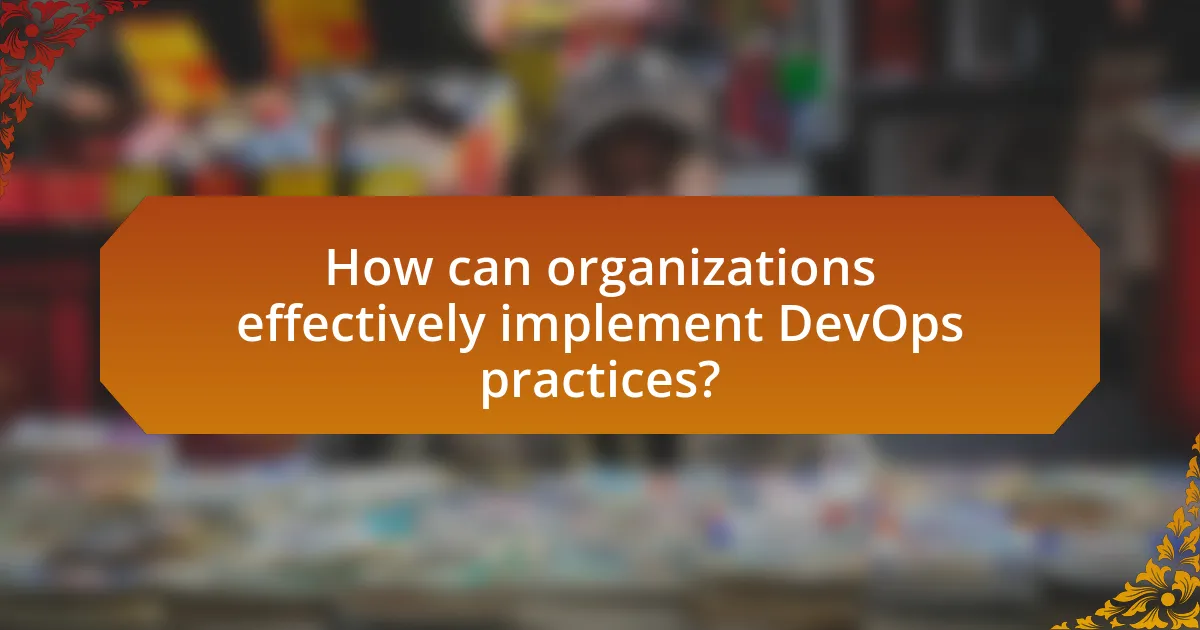The article focuses on the critical role of DevOps in modern software development methodologies, emphasizing its impact on collaboration between development and operations teams. It outlines how DevOps practices, such as continuous integration and continuous delivery (CI/CD), enhance software delivery speed and quality, leading to significant improvements in operational performance. Key principles of DevOps, including automation and monitoring, are discussed alongside insights from leading books that highlight successful implementations and best practices. The article also addresses common challenges in software development that DevOps helps to mitigate, providing a comprehensive overview of its importance in today’s software landscape.

What is the Role of DevOps in Modern Software Development Methodologies?
DevOps plays a critical role in modern software development methodologies by fostering collaboration between development and operations teams, which enhances the speed and quality of software delivery. This integration allows for continuous integration and continuous deployment (CI/CD), enabling teams to release updates more frequently and reliably. According to the 2021 State of DevOps Report, organizations that implement DevOps practices can achieve 24 times faster recovery from failures and 3 times lower change failure rates, demonstrating the effectiveness of DevOps in improving operational performance and customer satisfaction.
How does DevOps integrate with traditional software development practices?
DevOps integrates with traditional software development practices by fostering collaboration between development and operations teams, which enhances communication and efficiency. This integration is achieved through practices such as continuous integration and continuous delivery (CI/CD), which streamline the software release process and reduce the time to market. According to the 2021 State of DevOps Report, organizations that adopt DevOps practices experience 2.5 times more frequent deployments and 60 times faster recovery from failures, demonstrating the effectiveness of this integration in improving traditional methodologies.
What are the key principles of DevOps that influence software development?
The key principles of DevOps that influence software development include collaboration, automation, continuous integration and delivery, and monitoring. Collaboration fosters communication between development and operations teams, leading to faster problem resolution and improved product quality. Automation streamlines repetitive tasks, reducing human error and increasing efficiency. Continuous integration and delivery ensure that code changes are automatically tested and deployed, allowing for rapid iterations and quicker feedback. Monitoring provides insights into application performance and user experience, enabling proactive improvements. These principles collectively enhance the software development lifecycle, as supported by industry practices and case studies demonstrating increased deployment frequency and reduced lead times.
How does DevOps change the software development lifecycle?
DevOps transforms the software development lifecycle by integrating development and operations teams, which enhances collaboration and accelerates the delivery of software. This integration leads to continuous development, testing, and deployment, enabling faster feedback loops and more efficient problem resolution. According to the 2021 State of DevOps Report, organizations that adopt DevOps practices can achieve 46 times more frequent code deployments and 96 times faster mean time to recovery from failures, demonstrating significant improvements in performance and reliability.
Why is DevOps considered essential in today’s software development landscape?
DevOps is considered essential in today’s software development landscape because it enhances collaboration between development and operations teams, leading to faster delivery of high-quality software. This integration allows for continuous integration and continuous delivery (CI/CD), which significantly reduces the time from development to deployment. According to the 2021 State of DevOps Report, organizations that adopt DevOps practices can achieve 46 times more frequent code deployments and 96 times faster mean time to recovery from failures. These statistics demonstrate that DevOps not only improves efficiency but also increases the reliability of software products, making it a critical component in modern software development methodologies.
What challenges does DevOps address in software development?
DevOps addresses several key challenges in software development, including communication gaps, slow deployment cycles, and quality assurance issues. By fostering collaboration between development and operations teams, DevOps enhances communication, which reduces misunderstandings and accelerates project timelines. Additionally, DevOps practices, such as continuous integration and continuous delivery, streamline deployment processes, enabling faster releases and quicker feedback loops. Furthermore, automated testing and monitoring within DevOps frameworks improve software quality by identifying defects early in the development cycle, thus minimizing the risk of failures in production. These practices collectively lead to more efficient workflows and higher-quality software products.
How does DevOps improve collaboration among development and operations teams?
DevOps improves collaboration among development and operations teams by fostering a culture of shared responsibility and continuous communication. This integration leads to faster feedback loops, enabling teams to address issues more promptly and efficiently. According to the 2021 State of DevOps Report, organizations that adopt DevOps practices experience 46 times more frequent code deployments and 96 times faster mean time to recovery, demonstrating the effectiveness of collaboration in enhancing productivity and reducing downtime.

What insights do leading books provide about DevOps in software development?
Leading books on DevOps in software development emphasize the importance of collaboration, automation, and continuous delivery. For instance, “The Phoenix Project” by Gene Kim illustrates how integrating development and operations teams can significantly enhance productivity and reduce deployment times. Additionally, “Accelerate” by Nicole Forsgren, Jez Humble, and Gene Kim provides empirical evidence showing that organizations implementing DevOps practices achieve higher performance metrics, such as faster time to market and improved software quality. These insights collectively highlight that adopting DevOps principles leads to more efficient workflows and better alignment between IT and business objectives.
Which books are considered essential readings for understanding DevOps?
Essential readings for understanding DevOps include “The Phoenix Project” by Gene Kim, Kevin Behr, and George Spafford, which illustrates the principles of DevOps through a fictional narrative. Another key book is “The DevOps Handbook,” also by Gene Kim, Patrick Debois, John Willis, and Jez Humble, which provides a comprehensive guide on implementing DevOps practices. “Accelerate: The Science of Lean Software and DevOps” by Nicole Forsgren, Jez Humble, and Gene Kim offers research-backed insights into the performance benefits of DevOps. These books are widely recognized in the industry for their practical frameworks and methodologies that enhance collaboration and efficiency in software development.
What key concepts are highlighted in these leading books?
Key concepts highlighted in leading books on DevOps include continuous integration and continuous delivery (CI/CD), collaboration between development and operations teams, automation of processes, and a culture of shared responsibility. These concepts emphasize the importance of integrating development and operations to enhance software delivery speed and quality. For instance, “The Phoenix Project” by Gene Kim illustrates how CI/CD practices can streamline workflows, while “Accelerate” by Nicole Forsgren et al. provides empirical evidence showing that high-performing IT teams achieve better outcomes through effective collaboration and automation.
How do these books illustrate the practical application of DevOps?
These books illustrate the practical application of DevOps by providing real-world case studies, frameworks, and methodologies that organizations can implement. For instance, “The Phoenix Project” details a fictional company’s journey to adopt DevOps practices, highlighting the importance of collaboration and continuous delivery in improving operational efficiency. Similarly, “Accelerate” presents empirical research showing that organizations implementing DevOps achieve higher performance metrics, such as deployment frequency and lead time for changes. These examples serve as concrete evidence of how DevOps principles can be effectively applied to enhance software development processes and organizational performance.
What case studies or examples are presented in these books?
The books on the role of DevOps in modern software development methodologies present various case studies and examples that illustrate successful implementations of DevOps practices. For instance, “The Phoenix Project” by Gene Kim showcases the transformation of Parts Unlimited, a fictional company, highlighting how adopting DevOps principles improved collaboration and efficiency, leading to a significant reduction in lead time for software delivery. Additionally, “Accelerate” by Nicole Forsgren, Jez Humble, and Gene Kim provides empirical evidence from the State of DevOps Report, which includes case studies demonstrating that high-performing IT organizations achieve better outcomes in software delivery and operational performance through DevOps practices. These examples validate the effectiveness of DevOps in enhancing software development processes and organizational performance.
How do these examples demonstrate the effectiveness of DevOps?
The examples demonstrate the effectiveness of DevOps by showcasing improved collaboration, faster deployment times, and enhanced software quality. For instance, organizations that adopted DevOps practices reported a 46% increase in deployment frequency and a 96% reduction in lead time for changes, as highlighted in the “State of DevOps Report 2021.” These metrics illustrate how DevOps fosters a culture of continuous integration and delivery, leading to more efficient workflows and higher customer satisfaction.
What lessons can be learned from the successes and failures discussed?
The lessons learned from the successes and failures in the context of DevOps in modern software development methodologies emphasize the importance of collaboration, automation, and continuous feedback. Successful implementations demonstrate that fostering a culture of collaboration between development and operations teams leads to improved efficiency and faster delivery times. For instance, organizations that adopted continuous integration and continuous deployment practices reported a 30% reduction in deployment failures, highlighting the effectiveness of automation in minimizing human error. Conversely, failures often stem from a lack of communication and resistance to change, which can hinder the adoption of DevOps practices. This indicates that addressing cultural barriers and ensuring stakeholder buy-in are crucial for successful DevOps transformation.

How can organizations effectively implement DevOps practices?
Organizations can effectively implement DevOps practices by fostering a culture of collaboration between development and operations teams, utilizing automation tools, and adopting continuous integration and continuous delivery (CI/CD) pipelines. Collaboration enhances communication and breaks down silos, leading to faster problem resolution and improved product quality. Automation tools streamline repetitive tasks, reducing human error and increasing efficiency. CI/CD pipelines facilitate rapid deployment and feedback loops, allowing organizations to respond quickly to changes and customer needs. According to the 2021 State of DevOps Report, organizations that implement these practices experience 2.5 times more frequent code deployments and 24 times faster recovery from failures, demonstrating the effectiveness of DevOps in enhancing software delivery performance.
What are the best practices for adopting DevOps in a software development team?
The best practices for adopting DevOps in a software development team include fostering a culture of collaboration, automating processes, implementing continuous integration and continuous delivery (CI/CD), and utilizing monitoring and feedback loops. Collaboration among development and operations teams enhances communication and reduces silos, leading to faster problem resolution. Automation of repetitive tasks, such as testing and deployment, minimizes human error and accelerates delivery times. CI/CD practices ensure that code changes are automatically tested and deployed, which increases the reliability of software releases. Finally, monitoring and feedback loops allow teams to gather insights from production environments, enabling continuous improvement and quicker responses to issues. These practices are supported by industry research, such as the “State of DevOps Report,” which indicates that organizations implementing these strategies experience higher deployment frequency and improved software quality.
How can teams measure the success of their DevOps implementation?
Teams can measure the success of their DevOps implementation through key performance indicators (KPIs) such as deployment frequency, lead time for changes, mean time to recovery (MTTR), and change failure rate. These metrics provide quantifiable insights into the efficiency and effectiveness of the DevOps processes. For instance, a study by the DevOps Research and Assessment (DORA) found that high-performing DevOps teams deploy code 200 times more frequently than low performers, with a lead time for changes of less than one day. This data illustrates that successful DevOps implementation correlates with faster delivery and recovery times, validating the use of these KPIs as benchmarks for success.
What tools and technologies support DevOps practices?
DevOps practices are supported by a variety of tools and technologies that facilitate collaboration, automation, and continuous integration and delivery. Key tools include Jenkins for continuous integration, Docker for containerization, Kubernetes for orchestration, Git for version control, and Terraform for infrastructure as code. These tools enable teams to automate workflows, manage application deployment, and maintain consistent environments, thereby enhancing efficiency and reducing errors. The integration of these technologies is essential for achieving the goals of DevOps, which include faster delivery of software and improved collaboration between development and operations teams.
What common pitfalls should organizations avoid when implementing DevOps?
Organizations should avoid siloed teams when implementing DevOps, as this can hinder collaboration and communication. Siloed structures create barriers between development and operations, leading to inefficiencies and delays in software delivery. According to the 2020 State of DevOps Report, organizations that foster collaboration between teams experience 2.5 times more frequent code deployments and 12 times faster lead times. Additionally, organizations should not neglect cultural change, as a lack of buy-in from all levels can result in resistance to new practices. Emphasizing a culture of shared responsibility and continuous improvement is essential for successful DevOps adoption.
How can teams ensure continuous improvement in their DevOps processes?
Teams can ensure continuous improvement in their DevOps processes by implementing regular feedback loops and metrics analysis. By utilizing tools such as automated testing and continuous integration, teams can identify bottlenecks and areas for enhancement in real-time. Research indicates that organizations employing continuous feedback mechanisms experience a 30% increase in deployment frequency and a 50% reduction in lead time for changes, as highlighted in the “Accelerate: The Science of Lean Software and DevOps” by Nicole Forsgren, Jez Humble, and Gene Kim. This data underscores the effectiveness of structured feedback and metrics in driving ongoing improvements in DevOps practices.
What strategies can help overcome resistance to DevOps adoption?
To overcome resistance to DevOps adoption, organizations should implement strategies such as fostering a culture of collaboration, providing comprehensive training, and demonstrating quick wins. Fostering a culture of collaboration encourages open communication and teamwork, which are essential for successful DevOps practices. Comprehensive training equips employees with the necessary skills and knowledge, addressing fears of change and enhancing confidence in new processes. Demonstrating quick wins through pilot projects showcases the benefits of DevOps, helping to build momentum and support for broader implementation. These strategies are supported by research indicating that cultural change and skill development are critical factors in successful DevOps transitions.
What practical tips can enhance the effectiveness of DevOps in software development?
To enhance the effectiveness of DevOps in software development, organizations should implement continuous integration and continuous deployment (CI/CD) practices. CI/CD automates the software delivery process, allowing teams to release code changes more frequently and reliably. According to the 2021 State of DevOps Report, organizations that adopt CI/CD practices experience 46 times more frequent code deployments and 440 times faster lead time from commit to deploy, demonstrating significant improvements in efficiency and reliability. Additionally, fostering a culture of collaboration between development and operations teams further enhances DevOps effectiveness, as it encourages shared responsibility and communication, leading to faster problem resolution and innovation.


